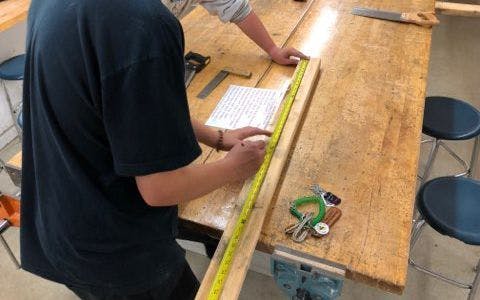
Like Kids in a Merit Shop: New Hampshire Program Turns Regular Shop Classes Into Trade Exploration
Efforts to solve the industry workforce shortage have gotten more creative and are taking root earlier in the education pipeline—or, at least they are in Manchester, New Hampshire, where an Associated Builders and Contractors-backed middle school trade program has been an immediate success.
Even before Jimmy Lehoux first ran for Manchester’s school board in 2017, he had long fostered the idea of vocational programs replacing outdated middle school woodshops. As subcontractor ambassador for architectural and construction management firm Procon Inc., Lehoux knew exactly whom to contact when building the new pilot program, which was given a unanimous green light by the local chapter’s board last year.
“At ABC, one of our big goals is to reinvest in our community and help our contractors with the goals they set out,” says ABC New Hampshire/Vermont Chapter President Joshua Reap. “It was a very easy fit for us.”
Lehoux’s concept, in essence, was to boil down existing ABC curriculum to make it accessible for middle schoolers. “The last thing you want is for an electrician to come in and show kids how to wire up a 120-Volt system,” explains Reap. That’s where ABC NH/VT’s Director, Education & Workforce Development Jennifer L. Landon came in. Her deep background in education, academia and workforce development ensured that Reap was best able to leverage his chapter’s knowledge and expertise for the classroom environment.
“We didn’t want to reinvent the wheel,” Lehoux says. With Landon’s facilitation, shop teachers spent the summer working on building a curriculum for the future success of the initiative. “Because this is a new concept, we wanted our shop teachers to have a say on how it gets built using their years of experience as educators,” Lehoux says.
The new course involves semester-long trade explorations in which students are able to spend two to three weeks on each topic. For example, Lehoux describes a process involving actual architectural tools, design and building “lingo,” and a project. Program volunteers bring tools, videos and samples to the class. From there, students learn tool safety, frame their own walls, and become versed in electrical and plumbing basics. After each progressive unit, a certified tradesperson provides a demonstration.
“It creates a career path for kids who want to go to the local technical high school,” Lehoux says. “There’s already a pathway.”
“What’s awesome is that other members are getting engaged,” Reap chimes in, referring to the multitudes of contractors who have already volunteered as speakers, performed a demonstration or lent equipment to the class. “They say ‘I want to get involved,’ or ‘I had a great time.’ ”
The response to the new initiative has been universally overwhelming, from ABC membership to top-tier politicians. When he heard about the program, New Hampshire Governor Chris Sununu reached out to Lehoux via New Hampshire’s Administrator of the Bureau of Career Development Eric Frauwirth. “As far as we know, this is the only program of its kind,” Lehoux says. Sununu has been quick to acknowledge the benefits of such a program—and quick to add to it. After just one year, and unanimous approval to launch the program throughout his district, Lehoux has already been conducting regular meetings with Frauwirth in order to provide the state with a handbook so that his dream can be rolled out statewide.
Lehoux has also succeeded at the federal level. While the middle schools lack Continuing Professional Education status, The Manchester School of Technology adopted the new program at the high school level, paving the way for Lehoux and his compatriots to apply for, and receive, a federal grant in the amount of $10,000.
Ultimately, says Reap, the achievements of the program are a “win-win” for the students and the workforce. Reap and Lehoux agree that siloing kids in schools by zip code (and generally socially isolating each other) is a common problem. The “exploration in construction” courses allow for an integration directly through high school, breaking down those societal barriers. Reap comments that this new programming is “just like we have in the merit shop.”
Reap continues, “At the end of the day, you want to get the job done successfully and in a good way for everybody. That’s what’s awesome: to see kids start out in middle school and grow those skills into a career.”
Related stories








